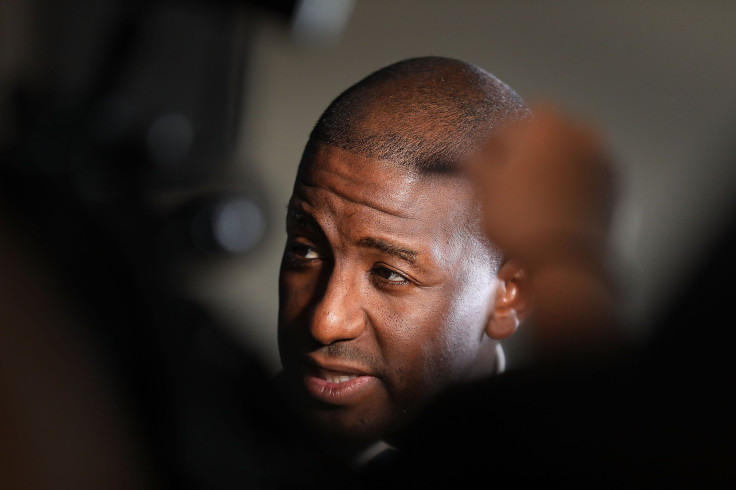Who Is Scott Rhodes? Provocative Robocalls Linked To Man With Racist History

Scott Rhodes of Sandpoint, Idaho, has been linked to the robocalls taking over Iowa and most recently, Florida, promoting anti-immigration rhetoric and attempting to influence a governor’s race by circulating racist commentary.
Rhodes, who also goes by the name Scott Platek, was identified by the Sandpoint police as the man who was caught on surveillance camera distributing racist CDs and flyers in a high school parking lot on Nov. 30. He was also suspected of harassing at least one Sandpoint resident.
Rhodes had denied distributing the racist material at the time, Spokesman Review reported. “No, I don’t think you do,” Rhodes responded at the time to the officers who confronted him with the allegations at his office. “Not me.”
He was suspected of producing the robocalls — which are essentially a minute-long prerecorded computerized audio clips that start playing the moment one picks up the call — even though each of those calls ended with Road To Power, a white-supremacist and anti-Semitic group that runs a website and neo-Nazi podcast by the same name, claiming credit for them.
The most recent set of robocalls targeted Democratic candidate Andrew Gillum, who if elected, would become the first African-American governor of Florida.
According to The Washington Post, the racism-filled speech in one of the calls was accompanied by a background score of drums and monkeys. The call began with, “Well, hello there. I is Andrew Gillum. We Negroes . . . done made mud huts while white folk waste a bunch of time making their home out of wood an' stone.'"
The voice in the call, talking on behalf of Gillum, went onto add that if he becomes the governor, he will pass a law by virtue of which all African-Americans will be able to evade arrests despite committing crimes.
While GOP candidate Ron DeSantis, also running in the governor's race, was heavily criticized for his racially-charged remarks on Gillum, he denied having anything to do with the robocalls, clarifying that his comments were directed at Gillum’s policies and not aimed at his skin color.
“This is absolutely appalling and disgusting — and hopefully whoever is behind this has to answer for this despicable action,” Stephen Lawson, a spokesman for the DeSantis campaign, said. “Our campaign has and will continue to focus solely on the issues that Floridians care about and uniting our state as we continue to build on our success."
On the other hand, Gillum, who maintained that he did not want the governor’s race to become one of name-calling, told the public to ignore the robocalls.
“This is reprehensible — and could only have come from someone with intentions to fuel hatred and seek publicity. Please don’t give it undeserved attention,” Gillum's spokesman, Geoff Burgan, said.
A similar strain of calls attempted to politicize the death of Iowa university student Mollie Tibbetts, after Cristhian Bahena Rivera, an illegal immigrant, was charged with her murder earlier this month.
The robocalls, which began Aug. 28, and was first reported by the Iowa Starting Line blog, twisted the comments of Tibbett’s family, all of whom had urged the public not to make her death into an anti-immigration discussion.
"If after her life has now been brutally stolen from her, she could be brought back to life for just one moment and asked, ‘What do you think now?’ Mollie Tibbetts would say, ‘Kill them all,'" the message on the call said.
Lynn Hicks, a spokesman for Iowa attorney general’s office, said although the alt-right groups have found the perfect weapon in robocalls for perpetuating their racist agenda by bridging the gap between their anonymous online spaces and the real world, it's not clear if their actions were illegal.
"I’ve listened to it. It’s awful. It’s repulsive,” Hicks said, Des Moines Register reported. “We’re looking into it, but it’s not the typical robocall we get complaints about because it’s non-commercial and, right now, we don’t have enough information to determine if it’s illegal.”
Although Rhodes’ involvement with the group Road To Power is not known, the police traced one robocall made to Alexandria Mayor Allison Silberberg and several City Council members in Virginia to one of his Idaho offices.
Rhodes denied his link to the robocall. “There has been an outrageous attempt by two small town papers to mislead readers to infer that I have something to do with actual crimes,” he wrote in an email to Spokesman Review. “Further, a single phone call to a public office holder, if truly made from my shared offices as alleged, is not a crime if the content was as they describe.”
A number of state and federal tax liens were lodged against Rhodes in the 1990s and early 2000s. He has previously lived in Oregon, California and Connecticut. Similar robocalls were reported during election campaigns in California and North Carolina.
© Copyright IBTimes 2024. All rights reserved.





















